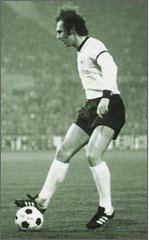The Goalkeeper. Pull off a remarkable save…you are showered with praise. Make a howler… get cursed to the high heavens. It’s a love-hate relationship. Jens Lehmann should know.
The goalkeeper is perhaps the only player to be defeated in the aftermath of a victory, knowing that the conceded goal could have been prevented. Therefore mental strength is a key factor in playing perhaps the most important role on the pitch. Pundits usually say a great ’keeper can bring at least six points to the cause of occupying a strong league position. In the repercussion of committing errors, a strong mind can erase the mistake and start again.
For example having been dropped soon after the end of the unbeaten run, Lehmann managed to turn his disappointment into his drive to regain his starting place (that and the lure of becoming first choice keeper for hosts Germany in the 2006 World Cup). In his error-strewn 2007/08 campaign, the German had to overcome criticism from the off, in games against Fulham and Blackburn, and later against Croatia at the Euros. Yet he kept his head up and reached the final, despite claims that he didn’t have enough match practice.
Confidence in one’s own ability can spread throughout the whole backline, resulting in assured rearguard performances. Almunia only came in after Lehmann had poor performances but his instalment into the side did not result in the 3-0 win against Birmingham in December 2004, for the Spaniard was shaky and had little communication with his back four. Compare the Almunia of then to now and you’ll see a new man and a new player. More assured in his own ability, the former Osasuna man is a solid base for Arsenal to play their style of football.
While Lehmann had a great mental belief in his own ability, being the old head in a young defence, he did not exactly spread assurance throughout the side. This was evident in his paranoid acts during set-pieces, thrown off his game, through instances as simple as having the opposition put a man on him. In a similar manner, he berated his team-mates for losing the ball in key areas, or if they passed to the wrong option. An example of this was raging at Alex Hleb in a game at Charlton, where Van Persie scored a majestic double.
Organisation skills is another attribute in great goalkeepers, but this can also be worked on the training ground, with each outfield player knowing his role, be it positionally in open play or when defending set pieces. Speed is important in this quality, especially with the worth of set pieces and the ability to take quick free-kicks. Due to the high defensive line, Almunia and Lehmann before him have often been seen as an 11th outfield player, with both having to play of their line, and join the play when necessary, whether sweeping up, like Jan Jongbloed, from the 1974 Netherlands side, who would perform a similar role, or releasing early balls in a more direct route and shifting possession swiftly. The end result is greater possession, with a keeper who is able to add to the side in an attacking sense rather than just in terms of goalkeeping. In the few seasons before this, Almunia had no idea when to come off his line; the worst consequence of this was the 4-2 defeat by Manchester United and being lobbed by John O’Shea of all people. But time on the training ground with coach Gerry Peyton has allowed him to work on this and his general reading of the game.
Fabianski on the other hand has a bravery to go for high balls and one-on-ones, and this quick decision making aids the side in the defensive aspect. But often his quick distribution affects the attacks, with the opposition still high up in our own half, and thus they can close down well, the most destructive instance of this was the defeat to Tottenham in the Carling Cup, while the inexperienced defence didn’t help either. Hesitate as Lehmann did in the first game of last season, and it could result in goals for the opposition. Another example was lack of speed, when Viduka, then of Leeds, charged down a clearance into the net during the unbeaten season, though it didn’t matter then, as we triumphed with ease.
The erection of the defensive wall has now been breached meaning reflexes and reaction of the keeper is important as the ball is not seen until very late. This is trained on vigorously and although reflexes are natural, reaction time can be improved in training. For example, Lehmann made a number of belief defying saves in the last season at Highbury such as the double save from Raul in possibly the greatest ever European match at Highbury. This can be down to improving diet and working on the same moves continuously, whilst building the body up to an optimum, as Lehmann did, being the consummate professional that he is. And so even at this veteran stage in his career, he is still able to make saves that others in this same age group would not be able to attempt.
While one ages, positioning and experience replace reflexes and agility, but eccentrics such as Arsenal’s German goalkeeper are prone to the odd error. Perhaps match rituals affect the mood of the goalkeeper. Lehmann, a very serious character, while he is a leader on the pitch (not necessarily by leading through example as the Stamford Bridge pantomime with Drogba portrays), his relationship with his competition for the number one jersey is less than comfortable to put kindly. Gabor Kiraly wore long bottoms for each game and performed well until a convincing defeat at Chelsea, where he, to Crystal Palace’s horror, wore shorts (the effect of the bottoms wore off soon after and hence Palace were relegated) It is these small beliefs that can affect a player greatly.
And a mention to the reserve: Once this was Almunia, who had played the waiting game for a number of seasons, till the point where he ‘hoped’ for a red card, and naturally not an injury…as is the case now (or not as the cynics claim). The waiting game is difficult; especially as in most cases the substitute keeper comes on the field of play, without a proper warm up and in many cases, he is not mentally prepared as David James claimed in the 4-1 friendly defeat to Denmark a few years ago.
Now it is Fabianski and Vito Mannone, who both will challenge Almunia for the number one spot. The former, is much greater prospect, and will no doubt improve and take the jersey over the next few years, but his Italian rival has less of a chance. His loan spell at Barnsley was riddled with errors, and his decision making seems poor – see his game against Barnet, although it was just a friendly. He is highly rated at the club but hasn’t proven himself yet to have a shot in the fight for Almunia’s newly found spot. There won’t be a new arrival in goalkeeping, so it will be these players who will fight it out. And if these options are exhausted, there is still the brilliantly named Wojciech Szczesny, who has already had a taste of top-flight football having appeared for his former club Legia Warsaw when he was just 15, where he was 3rd choice behind Fabianski himself.
But for now, Almunia looks to be the best bet for this next season. Have faith in the Spaniard, he will repay it.
Friday, 8 August 2008
Subscribe to:
Post Comments (Atom)



No comments:
Post a Comment